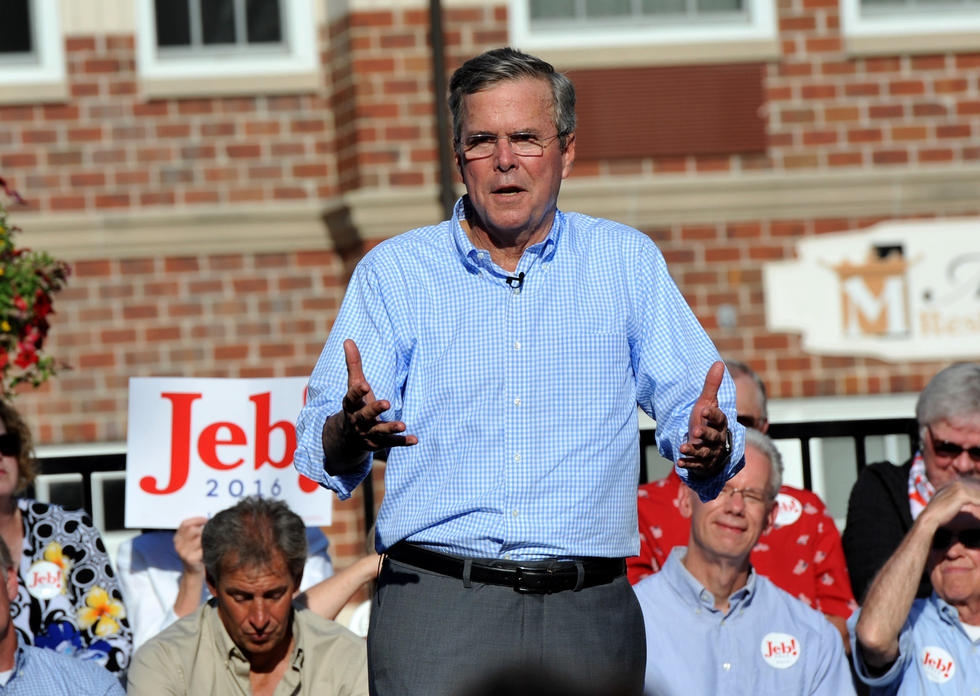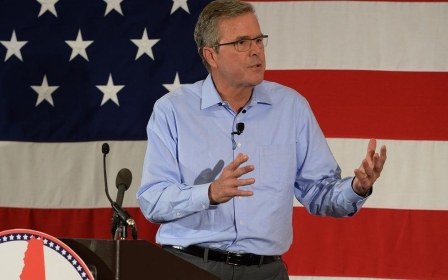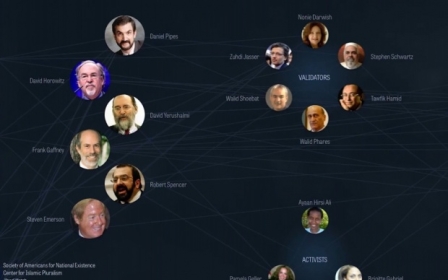Jeb Bush and the pro-Israel billionaires

On Monday Jeb Bush, the self-described introvert, stepped onto a stage in front of a room full of US flag-waving extroverts, to announce he is officially running for president in 2016.
It was a campaign announcement speech that had an abundance of red meat for every political carnivore across the entire US conservative spectrum.
Bush promised a return to “compassionate conservatism,” a promise underscored in a pre-speech video that had Bush hugging a young girl in a wheelchair. He reached out to black voters (Bush was introduced by a black minister); Hispanic voters (Bush delivered a paragraph of his speech in Spanish); Cuban exile voters (“We need an American president to go to Havana in solidarity with a free Cuban people”); white suburbanites (“Growth that lifts up the middle class”); and, of course, the Republican Party’s donor class - the rich (“Federal regulation has gone far past the consent of the governed”).
By every measure, it was a well-delivered speech that offered plenty of applause lines. But one line stood above all others and it prompted the adoring crowd to stomp their feet with ecstatic enthusiasm. It was the crescendo moment, the zenith of Bush’s sermon from the mount.
What applause line sent the Bushites into a rapturous frenzy?
“I will rebuild our vital friendships. That starts by standing with the brave, democratic state of Israel,” thundered Bush from the lectern.
Much has been written about the GOP’s pull to the hard right on Israel over the course of the past two decades, but Bush’s declaration to stand with Israel, and to say nothing of more strategically beneficial allies United Kingdom, Australia, Japan, India, Germany and co is a reminder that the bizarre has indeed become the absurd.
The state of Israel is now so inextricably woven into the conservative party’s DNA that it has joined early primary states Iowa, New Hampshire and South Carolina as eventual nominee defining. In other words, it’s now almost impossible for a candidate to become the Republican Party’s standard-bearer without winning a combination of the early voting states plus the support of pro-Israel campaign financiers.
Israel has become the primary within the primary. Bush’s loudest applause line was less a wink to the state of Israel than it was to the endlessly deep pockets of casino and media magnate Sheldon Adelson.
Adelson, who not only owns the Sands Corporation, but also the Israeli newspaper HaYom, and is listed as the world’s 18th richest person, has joined oil and gas oligarchs the Koch brothers as the biggest individual financiers of the Republican Party.
In 2012, Adelson shelled out a whopping $100 million to right-wing, pro-Israel candidates. While many of his preferred candidates lost, he almost singlehandedly shaped the GOP’s presidential primary. His cash not only kept candidates like Newt Gingrich and Rick Perry in the race longer than voter support justified, it also helped the unheralded Rick Santorum come within a whisker of dethroning establishment heavyweight and eventual nominee Mitt Romney. And by a whisker, I mean just a few thousand GOP primary votes in Wisconsin.
It’s no coincidence the GOP’s right tilt shift on Israel coincides with Adelson’s shift from the Democratic Party to the GOP. “I didn’t leave the Democrats, they left me,” Adelson wrote in a 2012 op-ed for The Wall Street Journal. “When members of the Democratic Party booed the inclusion of God and Jerusalem in their party platform this year, I thought of my parents. They would have been astounded.”
Adelson cites a Gallup Poll that shows “an overwhelming 78 percent of Republicans sympathise with Israel,” compared to only 53 percent among Democrats, as the driver for his changing political allegiances.
The US Supreme Court’s 2010 destruction of the firewall that separated the oligarchic class from political candidates and parties - a decision better known by the name of its plaintiff, Citizens United - has made support for Israel an inviolable litmus test for any Republican seriously considering a run for national office.
“If you’re a Republican and you hedge on your support on Israel, it’s viewed as having a flawed foreign policy,” Ron Bonjean, a party strategist who has worked for Republican leaders in Congress, told The New York Times. “It’s a requirement for Republicans these days to be very strong on Israel if they’re going to be taken seriously by primary voters.” Any deviation on that, he said, leads to inevitable questions: “If you’re not supporting Israel, then who are you supporting? Are you supporting Iran?”
Like every serious contender in the GOP primary, Bush is now a scholar of the 2012 election. For him to secure the nomination, he knows victory is impossible without Adelson’s blessing, and by blessing, I mean money.
In March of last year, Bush led a group of 2016 GOP hopefuls to woo Adelson at one of the magnate’s properties in Las Vegas. Accompanying Bush were three other prominent hopefuls - Governor Chris Christie of New Jersey, Governor Scott Walker of Wisconsin, and John Kasich of Ohio - but it was Bush who received top billing and it was Bush who emerged as Adelson’s preferred candidate.
A funny thing happened on the way to J Street in April of this year, however. James Baker, the former US Secretary of State and longtime friend of the Bush family, delivered a speech to the left leaning Jewish lobby J Street during its annual get together in Washington DC.
According to National Review, Adelson was furious over Bush’s refusal to bar James Baker from giving the speech to a liberal organisation. “I think he’s lost the Sheldon primary,” one Republican source told National Review, which shows how ideologically driven Adelson has become on the issue of Israel, especially as Baker’s speech included only one innocuous swipe at Netanyahu and the words, “The United States would never, never, never abandon Israel.”
In attempting to placate Adelson’s misguided ire, the Bush campaign issued a statement nevertheless. “While he [Bush] respects Secretary Baker, he disagrees with the sentiments he expressed last night and opposes J Street’s advocacy,” said the spokeswoman, Kristy Campbell. “Governor Bush’s support for Israel and Prime Minister Netanyahu is unwavering, and he believes it’s critically important our two nations work seamlessly to achieve peace in the region.”
Since then Bush has joined his Republican colleagues in a quest to be even more pro-Israel than Israeli Prime Minister Benjamin Netanyahu. A mere week after the Baker hullabaloo, Bush - after having spent the preceding months trying to distance himself from his brother, former president George W Bush - suddenly reversed course when he told a group of Wall Street financiers his brother was his most influential advisor on US-Israel policy. For good measure, Bush added that Baker is not one of his close advisers .
What seemed like a gaffe, given the negative political fall-out that inevitably comes from defending the Bush II presidency, was actually well measured political calculus. The calculus looks like this: you can’t win the support of GOP voters if you don’t first have Adelson’s cash, so better to risk upsetting voters now. You can always make it up to them later, when you’re flushed with Adelson’s cash.
Of course, Adelson isn’t the only pro-Israel billionaire funding Republican candidates. A New York Times investigation found that Senator Lindsay Graham (R-SC) saw his contributions from pro-Israel donors soar to more than $285,000 during the 2014 election. Freshman Senator Tom Cotton (R-AK), who burst into international prominence by leading a caucus of senators to pen a letter to the Ayatollah of Iran, received $960,000 from the Emergency Committee for Israel, which is led by the neoconservative columnist William Kristol. Cotton received (indirectly) $250,000 from Paul Singer, a hedge-fund billionaire and prominent donor to pro-Israel causes, and another $100,000 from Seth Klarman, a Boston-based pro-Israel billionaire.
In a historic first, Senate Republicans raised more political funds during a midterm election cycle in “direct, federally regulated campaign contributions from individuals and political action committees deemed pro-Israel than their Democratic counterparts," the Times added, citing data from the Center for Responsive Politics.
Paradoxically, Democrats enjoy the electoral support of a majority of Jewish American voters, while Republicans enjoy a majority of cash donations from pro-Israel donors. Clearly, it’s the cash that is pulling GOP leaders further to the right on Israel, who, in turn, are pulling the party’s base even further right, too.
“It’s remarkable,” boasted Kristol. “Bibi would probably win the GOP nomination if it were legal.”
While pro-Israel GOP donors are pumping historical and cultural falsehoods into the conservative echo chamber (“there isn’t a Palestinian alive who wasn’t raised on a curriculum of hatred and hostility toward the Jews” and that the “Palestinians are an invented people,” which are statements both attributed to Adelson), the prospects of a US-brokered Palestinian statehood are made ever more slim.
This, of course, is not breaking news for the Palestinians. They long ago gave up on the US playing an even-handed role in the peace process. Bush’s loudest applause line gives Palestinians every reason to remain pessimistic.
- CJ Werleman is the author of Crucifying America, God Hates You. Hate Him Back, Koran Curious, and is the host of Foreign Object. Follow him on twitter: @cjwerleman
The views expressed in this article belong to the author and do not necessarily reflect the editorial policy of Middle East Eye.
Photo: Republican presidential candidate, former Florida Gov. Jeb Bush speaks to a crowd of supporters June 17, 2014 in Pella, Iowa. (AFP)
New MEE newsletter: Jerusalem Dispatch
Sign up to get the latest insights and analysis on Israel-Palestine, alongside Turkey Unpacked and other MEE newsletters
Middle East Eye delivers independent and unrivalled coverage and analysis of the Middle East, North Africa and beyond. To learn more about republishing this content and the associated fees, please fill out this form. More about MEE can be found here.





